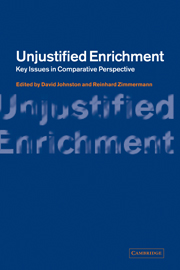Book contents
- Frontmatter
- Contents
- List of contributors
- Preface
- Table of cases
- List of abbreviations
- I Introduction
- II Enrichment ‘without legal ground’ or unjust factor approach
- III Failure of consideration
- IV Duress and fraud
- V Change of position
- VI Illegality
- VII Encroachment and restitution for wrongs
- VIII Improvements
- IX Discharge of another person's debt
- X Third-party enrichment
- XI Proprietary issues
- 20 Proprietary issues
- 21 Property, subsidiarity and unjust enrichment
- XII Taxonomy
- Index
20 - Proprietary issues
Published online by Cambridge University Press: 31 July 2009
- Frontmatter
- Contents
- List of contributors
- Preface
- Table of cases
- List of abbreviations
- I Introduction
- II Enrichment ‘without legal ground’ or unjust factor approach
- III Failure of consideration
- IV Duress and fraud
- V Change of position
- VI Illegality
- VII Encroachment and restitution for wrongs
- VIII Improvements
- IX Discharge of another person's debt
- X Third-party enrichment
- XI Proprietary issues
- 20 Proprietary issues
- 21 Property, subsidiarity and unjust enrichment
- XII Taxonomy
- Index
Summary
Introduction
In much of enrichment law, the question of ‘proprietary restitution’ can hardly arise. If P renders medical services to D, without a contract, P's claim will be a simple personal claim. Moreover, the civil-law tradition generally rejects ‘proprietary restitution’ in any circumstances. So is there really any value in discussing the matter from a comparative standpoint? I think that there is. Possibly a lawyer from a mixed system is well placed for the task. On the other hand, it may be that the task is impossible, especially since the English law in this area is complex, controversial and changing, and, of course, has that difficult dimension: equity.
‘Proprietary’
‘Proprietary’ is a term not generally used in Scots law. In Scots law rights are (following the ius commune) divided into real and personal. ‘Real’ and ‘proprietary’ do not coincide: the latter is broader than the former. Equitable rights in rem are proprietary in English law, but such rights are not real rights from the civilian standpoint.
A difficulty lies in the fact that in the common-law tradition a specifically enforceable claim to a thing is itself normally proprietary so that the claimant already has an equitable right in rem. That equity regards as done that which ought to have been may be a tired maxim but is still good law (or equity). If P has a right against D for the specific performance of an obligation to convey an identifiable thing, P will be considered the equitable owner.
- Type
- Chapter
- Information
- Unjustified EnrichmentKey Issues in Comparative Perspective, pp. 571 - 587Publisher: Cambridge University PressPrint publication year: 2002
- 1
- Cited by



